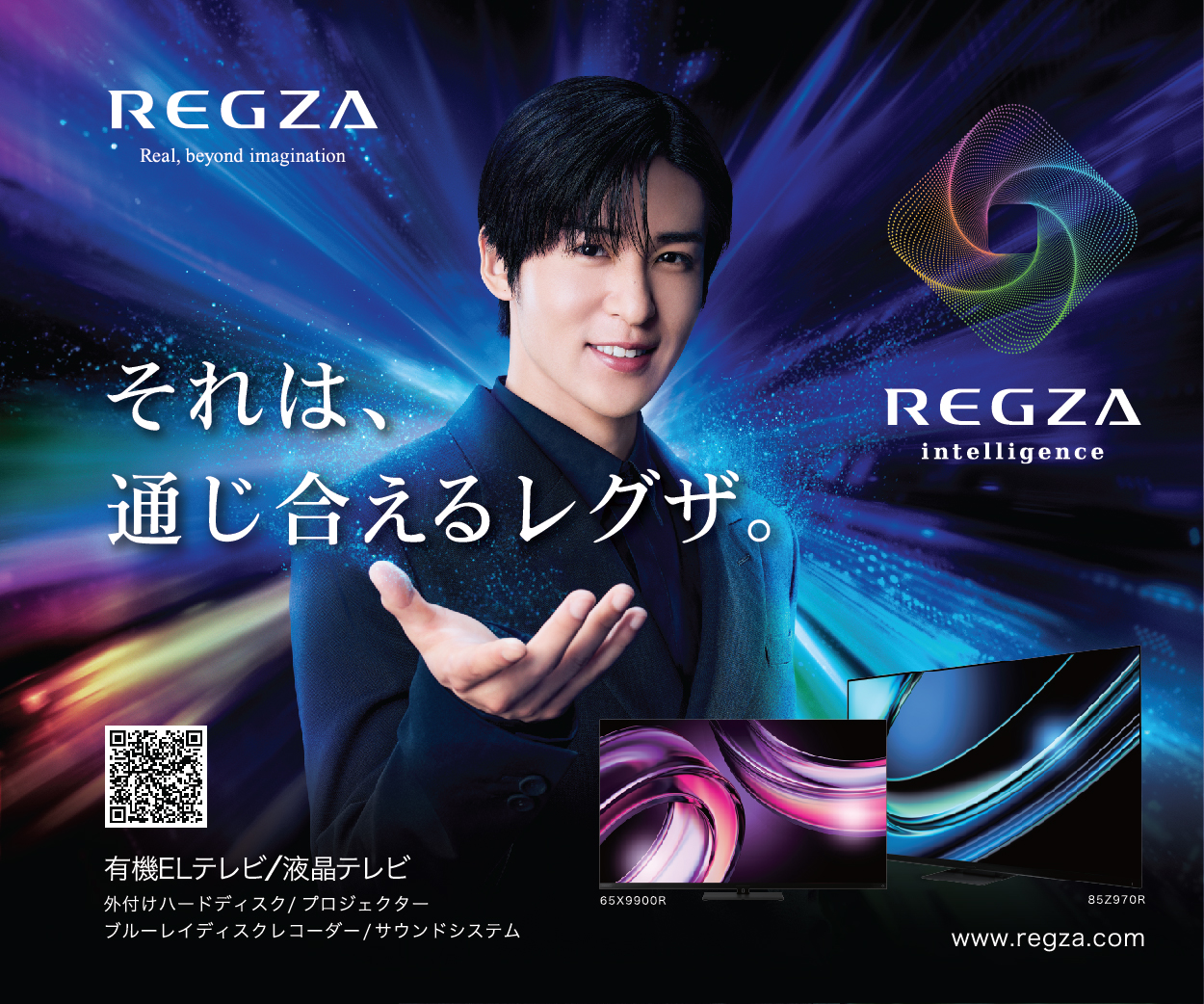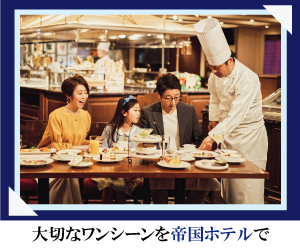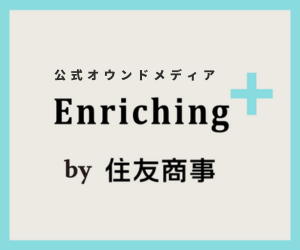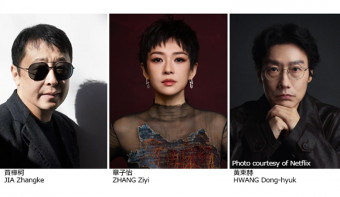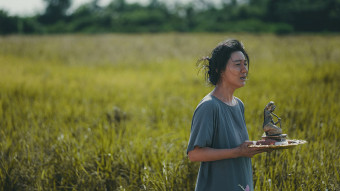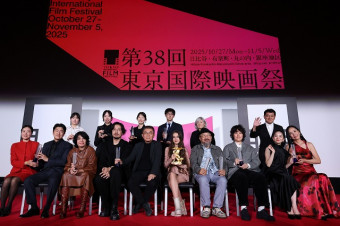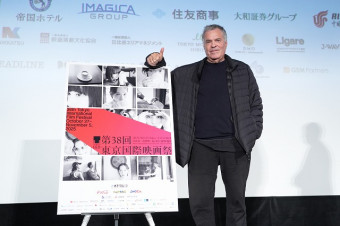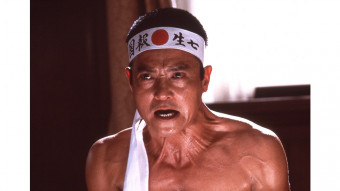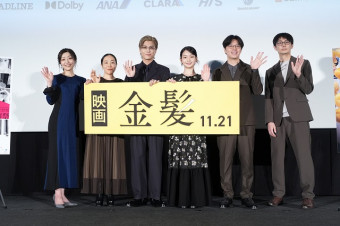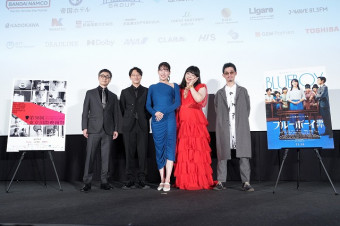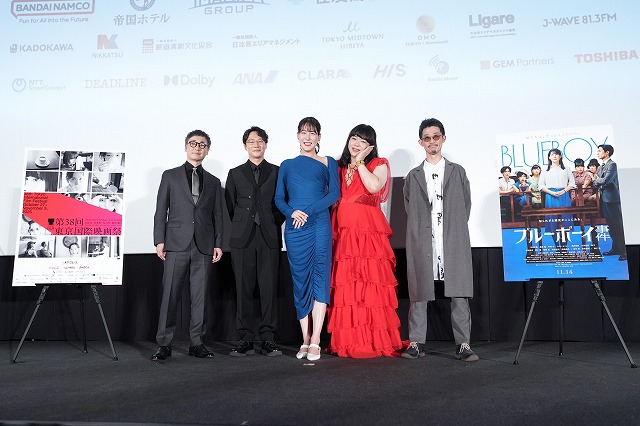
Director Iizuka Kasho and four of his actors appeared before the screening of the historical LGBTQ+ drama Blue Boy Trial on November 4, in the Gala Selection of the 38th Tokyo International Film Festival. Dressed to the nines in the style of their characters, but with a modern update (the film is set in the 1960s), Izumi Sexy was wearing a cascading red gown, Nakagawa Miyu was sleek and sophisticated in a blue frock, and Maehara Kou and Yasui Junpei wore serious suits.
Yasui, who plays a prosecutor in the film’s devastating courtroom scenes, introduced some immediate levity, asking the audience, “Are you hungry? Have you eaten? There are some quiet moments in the film, and I wouldn’t want you to be embarrassed by your growling stomach.”
Torn from 1960s tabloid headlines, Blue Boy Trial traces how a loophole in Japan’s new anti-prostitution laws exempted male and transgender sex workers—known as “blue boys.” Unable to arrest the blue boys themselves, authorities instead targeted the surgeon who had performed gender-affirming surgeries for some of them, leading to a sensational trial that inspires the film. It features exceptionally gifted transgender actors and stunning production design, and echoes today’s debates around gender identity.
Iizuka told the audience, “As a transgender male, I knew of the ‘blue boy trial,’ but I didn’t know the details. When I learned more about it, it was such a shock for me—in a good way—to discover that in the 1960s, there were people who were openly transgender themselves, standing in court. Since the history of the LGBTQ+ community in Japan is not well known, I felt compelled to share it, and started writing the script.”
Asked about his casting of the two female actors, the director said, “When we decided to do an open casting call for sexual minority actors, I think it was first time in Japan, and 40 people showed up. We had them do the testimony scene at the audition, and when Ms. Nakagawa did the scene, based on her own experience, her sensibility was really conveyed through the dialogue. I realized that only a transgender actor could bring that to the role of Sachi.”
Nakagawa, who plays Sachi, admitted her initial reaction was one of shock and puzzlement. “When I got the news that I passed the audition, the first feeling was, ‘Why me?’ Because I’d never acted before.” On the other hand, Izumi, who plays Aako, said, “I’m not that spiritual person, but when I heard about the audition, I kind of had a hunch that I might get it.”
The director told the audience, “Actually, the producer found Izumi Sexy on social media, when she posted a faux marriage press conference with (Korean star) Gong Yoo, and she kept on and on for an hour! I thought, ‘Oh, she can act.’ That’s why we asked her to join us for the audition.”
Nakagawa admitted that it was challenging to work on developing her character, whose participation in the trial, after resisting requests to go public for some time, is essential. “This was my first time, so I didn’t know what to do. But they gave us enough time to prepare and I took some acting classes.”
Izumi chimed in, “I also took classes for a month before shooting and we rehearsed the scenes many times before the camera rolled.”
Established actors Maehara and Yasui praised the authentic presence of their first-time costars. Maehara plays Sachi’s lover, said he didn’t need much character preparation, “because Nakagawa-san really seemed to be Sachi on the set. So I could just be Wakamura Atsuhiko, who loves Sachi.”
Iizuka said that his main request to Maehara had been simple: “I want the truth to be seen on the screen—the fact that Wakamura and Sachi are very much in love. Just show me that. And we actually wound up talking about cats before rolling the camera.”
Yasui’s prosecutor is a character who [has to] interrogate the blue boys, and he’s trying to damage and conquer them, and to use all these awful words to beat them. It was so painful to say those lines. I didn’t know much about transgender issues, so I got together for dinner with Ms. Nakagawa and Ms. Izumi to talk about it. I might have asked them some rude questions, but I wanted to make sure that they knew I wasn’t their enemy. My character is an enemy to them, but I myself am not. Then, when we shot the film, I shed all the friendship that we built and became a real villain. When you watch the film, you’ll see that [the prosecutor] has reasons and sense of mission.”
In closing, Nakagawa said, “I think this is a heartwarming story asking, ‘What is happiness?’ We all have the right to be happy, even though the shape and color of happiness is different depending on who you are. I’m so happy that we can show this film to all of you today.”
Iizuka ended the stage greeting with a call to reflection: “We started this project believing that this film is necessary for our time, our era now,” he said. “This is set in the 1960s, but when you leave the theater, I would like you to think about what kind of era we’re in right now.”
Greetings from the Stage: Gala Selection
Blue Boy Trial
Guests: Iizuka Kasho (Directer), Nakagawa Miyu (Actor), Izumi Sexy (Actor), Maehara Kou (Actor), Yasui Junpei (Actor)
















